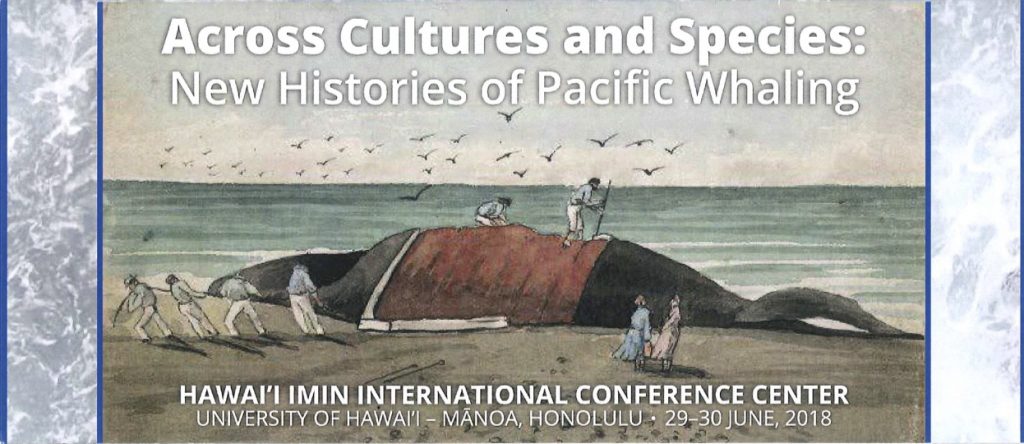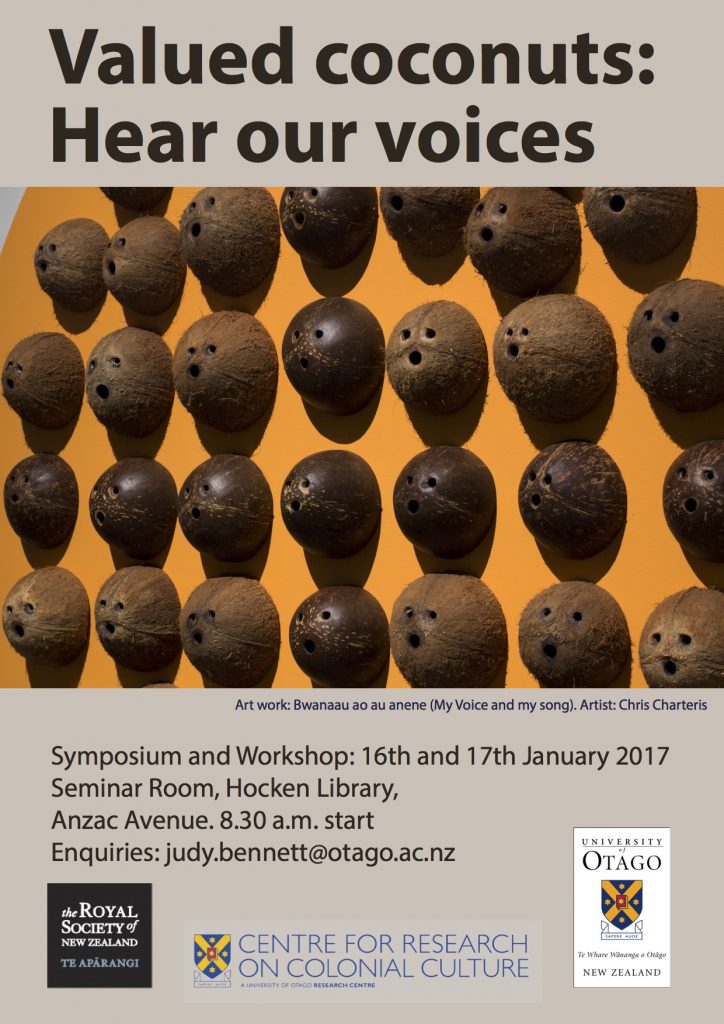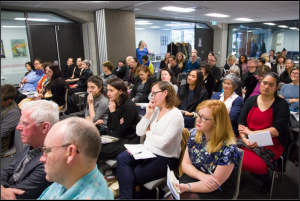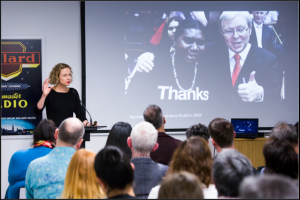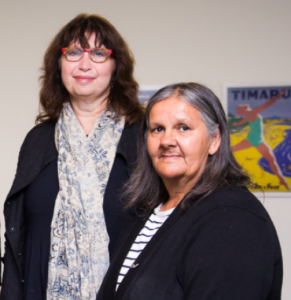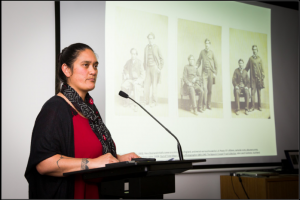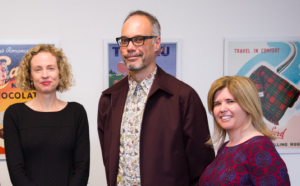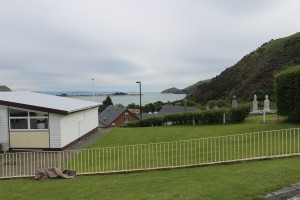Conference Report: Across Cultures and Species
In late June, the Centre co-sponsored a two-day pre-read workshop at Honolulu on new histories of pacific whaling. Participants were invited to think about animal-human interactions, as well as the intersection between environmental and cross-cultural histories. The workshop was led by Ryan Tucker Jones (University of Oregon) with support from Centre member, Angela Wanhalla, and generously supported by the Rachel Carson Center for Environment and Society.
The workshop opened with a paper by Susan Lebo (State Historic Preservation Office, Hawaii) that made a case for newspapers as integral, but overlooked, sources for revealing Hawaii’s whaling history, particularly Hawaiian-language newspapers, which feature Indigenous narratives. Lissa Wadewitz (Linfield College) examined the paradox of the violence involved in hunting and processing whales and their sometimes professed sentimentality for the animals, which she set within a context of a growing animal welfare movement in the United States. Vicki Luker (ANU) narrated the story of whaling in Fiji through the experiences of a chief and chiefly politics, while Adam Paterson (South Australia Maritime Museum) discussed a collaborative project on whalers and cross-cultural history at Encounter Bay, South Australia, emphasising Ngarrinderjeri perspectives about whales. Kate Stevens and Angela Wanhalla (University of Otago) took us to southern New Zealand where they used kinship as a framework of analysis to explore Kāi Tahu women’s participation in the shore whaling industry and their association with the sea. We concluded the first day with Nancy Shoemaker‘s (University of Connecticut) paper on the global trade in whale products and Akamine Jun‘s (Hitotsubashi University) interrogation of coastal whaling in Japan and how this shaped particular food cultures.
Day two opened with a session on Japan. Jakobina Arch (Whitman College) discussed the role of pelagic whaling in advancing Japan’s territorial expansion in the Pacific, while Noell Wilson (University of Mississippi) considered whaling cultures in the 19th century Hokkaido maritime region, focusing on the Ainu. In the second set of papers, Bathseba Demuth (Brown University) addressed capitalism in the early north pacific through the perspective of bowhead whales, inserting whale agency into human history. Jason Colby (Victoria) turned to the capture of grey whales for Seaworld in California, how this shaped scientific research and influenced human understanding of whales during an international movement focused on conservation and protection. The workshop closed with two papers that considered whaling and whales within contemporary Indigenous contexts. Jonathan Clapperton’s (Independent historian) paper addressed Puget Sound Salish Culture and legal claims to being whaling people, while Billie Lythberg (Auckland University) and Wayne Ngata (former Chair of the Māori Language Commission) told the story of Paikea, a whale and human ancestor, embodied by a tekoteko (carved human form) held by the American Natural History Museum in New York, who they hope to return home to his people. The workshop closed with a keynote address from Joshua L. Reid (University of Washington) at the Bishop Museum that centred Indigenous experience and perspectives at the heart of new histories of Pacific whaling.
Visiting Scholar: Prof. Pamela Klassen
With Religious Studies the Centre is co-hosting a visiting scholar, Pamela Klassen, Professor in the Department for the Study of Religion at the University of Toronto, where she is also Vice-Dean, Undergraduate & International in the Faculty of Arts & Science. The author of many books and articles, her most recent publications are The Story of Radio Mind: A Missionary’s Journey on Indigenous Land (U of Chicago Press, 2018) and Ekklesia: Three Inquiries in Church and State (U of Chicago Press, 2018), co-authored with Paul Christopher Johnson and Winnifred Fallers Sullivan. She currently holds the Anneliese Maier Research Award from the Humboldt Foundation in support of a five-year collaborative project entitled “Religion and Public Memory in Multicultural Societies,” undertaken together with Prof. Dr. Monique Scheer of the University of Tübingen. For more information, see http://projects.chass.utoronto.ca/pklassen/
While in Dunedin Prof. Klassen will give several public talks. The first is a research seminar in the Department of History and Art History, Wednesday 11 April, 3.30pm, in Burns 5, ground floor Arts Building (95 Albany Street) on the topic “Photography, Resistance, and Re-mediation on Manidoo Ziibi”.
In this presentation, Prof. Klassen will consider the significance for studies of missionary colonialism of what scholars call the “photographic event,” focusing on a diary written by an Anglican missionary-journalist, Frederick Du Vernet, during his 1898 trip to visit the Ojibwe of Rainy River in Treaty 3 territory (also known in Canada as northwestern Ontario). Du Vernet recorded both Ojibwe resistance to and requests for his picture-taking. His stories reveal how the event of taking photographs marked his own longing to capture spiritual stories and presences and provoked a variety of Ojibwe responses to such forms of visual capture. The talk will also introduce a new visual/textual/audio remediation of the diary in the form of a digital storytelling website being developed with a team of students in consultation with the Kay-Nah-Chi-Wah-Nung Historical Centre of the Rainy River First Nations.
Two further public talks are planned:
“Frequencies for Listening: Telling Stories of Missionary Colonialism in the Wake of Canada’s Truth and Reconciliation Commission on Indian Residential Schools”, Public Lecture co-sponsored by the Centre for Research on Colonial Culture, 18 April.
“Treaty people and the spiritual vulnerability of colonial settlement”, a research presentation hosted by the Department of Theology and Religion, 20 April.
Further details about these events will be advertised in the near future.
Museums, Digital Collections and Indigenous Futures Talks
All are welcome to attend an open seminar on Thursday 22 February featuring two scholars who will speak about their current projects that aim to reconnect indigenous communities with objects and archives, making them available for future use and reinterpretation.
Location: Moot Court, 10th Floor, Richardson Building, starting at 10am
Associate Professor Aaron Glass (Bard Graduate Center, New York) will discuss his involvement in producing a new critical edition of anthropologist Franz Boas’s 1897 landmark book, The Social Organization and Secret Societies of the Kwakiutl Indians, which uses digital media to link museums, archives and communities while recuperating ethnographic records for current and future use. Not only did the volume make draw upon existing museum collections from around the world, Boas and his indigenous collaborator, George Hunt, left a vast archive of unpublished materials relevant to the creation and afterlife of the 1897 text, including hundreds of pages of Hunt’s corrections and amendments. An international and collaborative endeavour to create a new annotated critical edition of the book – both in print and in digital formats – unites published and unpublished materials with current Kwakwaka’wakw knowledge. This presentation discusses that project and presents an interactive prototype for the digital edition that re-embeds ethnographic knowledge within Indigenous epistemological frameworks and hereditary protocols for access.
Associate Professor Conal McCarthy (Victoria University of Wellington) will outline two current trends in museum research in Australia and Aotearoa: one looking back to the history of collections, ethnology and colonisation, and the other looking forward to digital technology, co-curating and an emerging indigenous Museology. It will briefly introduce various projects which aim to reconnect tribal descendants to ancestral heritage through digital tools which enable the reassembly of scattered records, material culture and images. It will introduce the Marsden-funed project ‘Te Ao Hou: Imagining Worlds in New Zealand, 1900-1950’ led by Anne Salmond at Auckland University, which follows Māori leaders Apirana Ngata and Peter Buck through their involvement in the Dominion Museum ethnological expeditions, the Polynesian Society and the Board of Māori Ethnological Research. It considers the mobilising of relational concepts such as whakaapa/kinship, which were applied in Buck and Ngata’s ‘practical anthropology’, and the lessons of their experiments for both Māori museum practice today and contemporary tribal development generally.
REMINDER: CFP, Film in the Colony Symposium
Don’t forget the Film in the Colony Symposium, to be held in Wellington, 13-14 July.
https://blogs.otago.ac.nz/crocc/film-in-the-colony-symposium/
If you are interested in presenting a paper, send a 200-word abstract and a brief bio to: filminthecolony@otago.ac.nz by 28 February 2017.
Forthcoming Symposium. Valued Coconuts: Hear Our Voices
Prof. Judy Bennett is convening a pre-read symposium at the Hocken Collections on 16 & 17 January 2017. It is a key outcome from her Royal Society of New Zealand Marsden Project with Dr. Kate Stevens, Constant Coconuts: A history of a versatile commodity in the Pacific World.
This symposium focuses on six pre-circulated papers. They address different Pacific sites in regard to the history of a range of Indigenous interactions with coconuts in everyday life as well as a commodity. In addition to considering the variety of Indigenous voices, most papers also examine interactions of colonial agents—administrators, traders, planters, and mission organisations—with this commodity in the form of coconut oil or copra. There are to be assigned commentators for each paper, but presenters also have 20 minutes each to introduce and discuss their research to the wider audience.
All are welcome to attend and contribute to the discussions where appropriate. For more information contact Judy Bennett (judy.bennet@otago.ac.nz)
In Search of Almighty Voice
In this talk Professor Bill Waiser examines why the Willow Cree man Almighty Voice was the most wanted fugitive in Canada in the late nineteenth century and how his story and fate have been interpreted since his violent 1897 death at the hands of the North West Mounted Police.
The Centre is delighted to be hosting award-winning historian Bill Waiser (University of Saskatchewan), who will give a talk on his current research project on Wednesday March 9th in Burns 5 (Arts Building), beginning at 3.30.
Bill specializes in western Canadian history. He has been awarded the Saskatchewan Order of Merit, elected a fellow of the Royal Society of Canada, granted a D.Litt., and is a University of Saskatchewan Distinguished Chair (Distinguished Professor Emeritus). His most notable publications include: Saskatchewan: A New History (2005), winner of the Clio Prize, Canadian Historical Association; and with Blair Stonechild, Loyal Till Death: Indians and the North-West Rebellion (1997), a finalist for the Governor General’s Literary Award for non-fiction.
This talk is free and open to the public. Please come along!
Stimulating symposium on Indigenous Photographic Histories
Practitioners, curators, archivists, scholars and others flocked to the Indigenous Photographic Histories Symposium held at the National Library in Wellington on 5 November, an immensely successful one-day event co-organized by Paul Diamond (Alexander Turnbull Library), Angela Wanhalla (CROCC/University of Otago) and Jane Lydon (University of Western Australia, Perth).
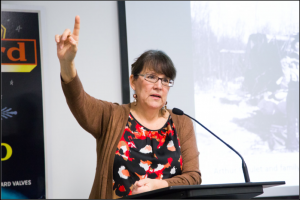
Keynote speaker: Professor Sherry Farrell Racette. Photo: Mark Beatty, Imaging Services, National Library
The symposium kicked off with two keynotes. The first, Professor Sherry Farrell Racette (Manitoba) on “Enclosing some Snapshots”: James P. Brady, Photography and Political Activism, showed how photography was such an integral part of the work of this well-known Métis activist. A self-taught community-based photographer, Brady used it record Metis life at a time when these communities were impoverished and its people lacked rights.
Professor Jane Lydon then gave Aboriginal Transformations of the Photographic Archive on how Aboriginal communities are now using historic photographs. She traced the emotional and healing properties of photographs, and echoing Sherry Farrell Racette’s keynote, pointed to the link between photography, rights and political activism. Drawing upon her Australian Research Council-funded project that identifies and returns Aboriginal photographs held in European collections, Jane noted that while photographs carry the burden of the colonial past, Aboriginal families see them as ways to connect with family and place. To read more about that ARC project have a look at the website: Returning Photographs: Australian Aboriginal Photographs from European Collections
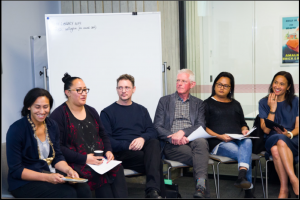
From left: Edith Amituanai, Nina Tonga, Brook Andrew, Paul McNamara, Yuki Kihara, and Jeanette Wikaira. Photo: Mark Beatty, Imaging Services, National Library
After morning tea, a panel of shorter talks ensued, first from three practitioners/artists: Edith Amituanai (Unitec), on the ethics of taking photographs in terms of her own work. Edith spoke about her community-based photography, recording Samoan people and their everyday lives in New Zealand and beyond. She gave us one of the most evocative sentences of the day when she described a photograph as an ‘incomplete utterance of a sentence’; Brook Andrew of Wiradjuri (Monash) discussed the complexities of representation, and his own obsession with the colonial archives, which he uses in his artwork; and Yuki Kihara gave a tour-de-force presentation on the intellectual work underpinning her recent “A Study of a Samoan Savage”, which was inspired by early “scientific” photographs of Samoans in the archive. These were followed by reflections from three people who deal with collections: Paul McNamara on how photographers had utilized the archives in various exhibitions at the McNamara Gallery in Whanganui; Nina Tonga, Te Papa’s Curator Pacific Cultures, on the photography of George Crummer, a trader in the Cook Islands from 1890; and Jeanette Wikaira, Kaituitui Ratonga Māori on how Kai Tahu families interact with the photographic archives of the Hocken Library.
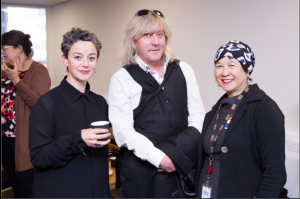
Helen Brown (left) enjoying a break in proceedings with Lyndon Fraser (Canterbury University), and Lynette Shum, Oral History Advisor at the Turnbull. Photo: Mark Beatty, Imaging Services, National Library
The suite of papers reflected on community, place and family. Natalie Robertson of AUT was unable to be at the symposium, but her Siting Mauri through Living Film and Photography using material relating to Ngāti Porou and the Waiapu River was wonderfully and elegantly presented for her by AUT doctoral candidate and photographer Ngahuia Harrison. Helen Brown of Ngai Tahu Archives presented on Wiremu Teira and his Māori Friends where she discussed the Pākehā writer and photographer William A. Taylor and his relationships with Ngāi Tahu communities.
New Zealanders are probably unaware that Aboriginal families, not allowed to live alongside white Australians were relegated to “fringe camps” on the outskirts of outback towns. Karen Hughes (Swinburne University) and renowned Ngarrindjeri weaver Aunty Ellen Trevorrow (Camp Coorong Race Relations Cultural Education Centre) showed life in Ngarrindgeri camps through the intimate and familial portraits made by Aboriginal women photographers.
Chanel Clarke, Māori Curator, Auckland Museum, rounded off the after-lunch session with Dressing the Part: Queen Victoria’s Māori Subjects, on the intersections of dress, photography and colonialism during a visit of Māori to England in the early 1860s. The symposium was lucky to have three “keynote listeners” who all gave their impressions and reflections on the earlier sessions: Damon Salesa (Auckland), Jo Smith (Victoria), and Tina Makereti (novelist, Curator Māori, Museums Wellington). All three touched upon several important themes that united all the presentations: the affective power of photography, the ethics of photography, the rich and varied methodologies being deployed, and the ongoing power of colonial images in the present day.
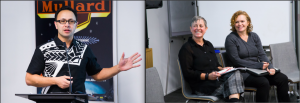
Wonderful “keynote listeners”: Damon Salesa, Jo Smith, and Tina Makereti. Photos: Mark Beatty, Imaging Services, National Library
It was wonderful to be exposed to insights from so many indigenous scholars and practitioners. It was also gratifying to hear how indigenous communities are now using the photographic archives, even those heavily underlain with the violence of colonialism, for their own purposes, as art, for rediscovering histories, and reconnecting communities.
Indigenous Mobilities Symposium
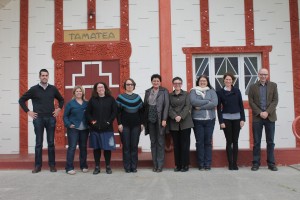
From left, Michael Stevens, Angela Wanhalla, Jane Carey, Kristyn Harman, Regina Ganter, Rachel Standfield, Shino Konishi, Tiffany Shellam, Tony Ballantyne. (Lachy Paterson photographer).
On Thursday and Friday (20-21 Nov) scholars assembled at Ōtākou marae, on the Otago Peninsula near Dunedin, for a pre-read symposium, “Rethinking Native Spaces: Indigenous Mobilities Across and Beyond the Antipodes”, co-organized by the Centre for Research on Colonial Culture of University of Otago and the Monash Indigenous Centre of Monash University. Attending were Tony Ballantyne, Michael Stevens, Angela Wanhalla and Lachy Paterson from CROCC and Rachel Standfield of MIC as well as Shino Konishi (University of Western Australia), Kristyn Harman (University of Tasmania), Tiffany Shellam (Deakin University), Regina Ganter (Griffith University) and Jane Carey (University of Wollongong). Unfortunately Lynette Russell of MIC was unable to attend. Research presented focused on a number of different aspects of Māori and Aboriginal travel in the colonial period, both within New Zealand and Australia but also further afield. A publication is planned. CROCC would like to acknowledge Rachel Standfield in particular for her hard work in bringing this event to fruition.

